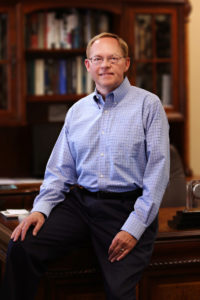 University of Utah chemical engineering graduate, Peter D. Meldrum, co-founder of Myriad Genetics whose research team was the first to develop a commercial test for the breast cancer gene, died Dec. 20 following an accident. He was 71.
University of Utah chemical engineering graduate, Peter D. Meldrum, co-founder of Myriad Genetics whose research team was the first to develop a commercial test for the breast cancer gene, died Dec. 20 following an accident. He was 71.
Meldrum, who was once named one of Scientific American’s Top 50 Scientific Visionaries in the world, was a lifelong benefactor of the U’s College of Engineering and a founding member of its Engineering National Advisory Council. He will be remembered not only for his pioneering efforts in molecular diagnostics but also for his generous support for the next generation of engineers.
“Pete Meldrum was one of the most successful and distinguished alumni of the College of Engineering. But he was more than that. He was one of the most generous, kind and good men that I have known,” said U College of Engineering Dean Richard B. Brown. “He will be sorely missed by all who knew him. Pete left a great legacy at Myriad Genetics, at the University of Utah, and throughout the community. I commend him as an example to all of our students.”
Meldrum was born June 26, 1947, in Salt Lake City, Utah, the eldest son of Benjamin “Nibs” Meldrum and Grace Durkee Meldrum. He met his wife, Catherine Marie Roper, at the University of Utah where they were both undergraduate students. They were married June 16, 1970, in Salt Lake City, and they had one son.
Meldrum graduated from the University of Utah with a bachelor’s degree in chemical engineering in 1970 and then served a two-year stint as a radiological officer in the U.S. Army. Upon his return, he earned a master’s in business administration and started a venture capital firm. In 1991, he and U genetics researcher and professor Mark Skolnick launched their company, Salt Lake City-based Myriad Genetics. Under Meldrum’s leadership, Myriad’s research teams would be the first to develop a commercial test for the BRCA1 and BRCA2 hereditary genes responsible for breast and ovarian cancers. The test could predict whether or not a patient was more likely to get a disease in the future. Today, Myriad produces more than a dozen products — mostly in the form of blood tests — that inform patients whether they carry a particular gene that increases the risk of cancer. The company has grown to 2,800 employees with operations in Austin; Cologne, Germany; Mason, Ohio; Munich; San Francisco; and Zurich, Switzerland.
“I told Mark [Skolnick] when we started Myriad that the odds of us being successful were one in ten in the technology field, so this was probably going to go nowhere. But I told him it’s a fascinating science and it’s going to be fun,” Meldrum said in 2016. “We had no idea Myriad would evolve into what it is today. It’s been an enjoyable, fun ride.”
In 2015, Meldrum retired from Myriad after 24 years as its president and chief executive officer. Since then, he served as executive director of The Meldrum Foundation, the family’s private charitable foundation that supports educational endeavors, artistic activities, and humanitarian programs. He and his wife have contributed to countless efforts for the U’s College of Engineering, including support for the Peter and Catherine Meldrum Innovation Laboratory in the Department of Chemical Engineering and the Peter D. and Catherine R. Meldrum Endowed Professorship in Chemical Engineering.
A lover of the arts, he served on many boards of local arts organizations including Pioneer Theater Company and Ballet West. In 2011, he received the prestigious “Bravo Award” for his philanthropic efforts for the arts. He also served on boards for Westminster College, the Museum of Natural History, the National Advisory Council, and Fine Arts Advisory Boards of the University of Utah.
Meldrum was awarded the “Governor’s Medal for Science and Technology” in 1998 and received the “Mountain West Venture’s Entrepreneur of the Year Award” in 2001. He also received the “Distinguished Chemical Engineer Award” from the U in 2007 and the “American Federation for Aging Research Award of Distinction” in 2008. He was inducted into the Utah Technology Hall of Fame in 2009 and received an honorary Doctor of Engineering degree from the University of Utah in 2009.
Meldrum is survived by his wife, Catherine; his brother, Daniel (Patty); his son Christopher (Jenette); three grandsons, Ian, Colin, and Aidan; and multiple nephews and nieces. Pete was preceded in death by his parents, Grace and Benjamin Meldrum.
A funeral mass will be celebrated at 9 a.m. on Saturday, Dec. 29 at Saint Ambrose Catholic Church, 1975 S. 2300 East. A vigil service will be held at 7 p.m. on Friday, Dec. 28 at Neil O’Donnell and Sons Mortuary, 372 E. 100 South, where friends may call from 6 to 7 p.m. Committal, Mt. Olivet Cemetery, 1342 E. 500 South.
In lieu of flowers, the family suggests donations to the Meldrum Family Scholarship at the University of Utah, awarded to first-generation undergraduate college students with financial need.
Contributions can be mailed to:
The University of Utah Development Office
332 S. 1400 East, Suite 150
Salt Lake City, Utah, 84112-0300
You may also call 801-581-6825 or 800-716-0377.